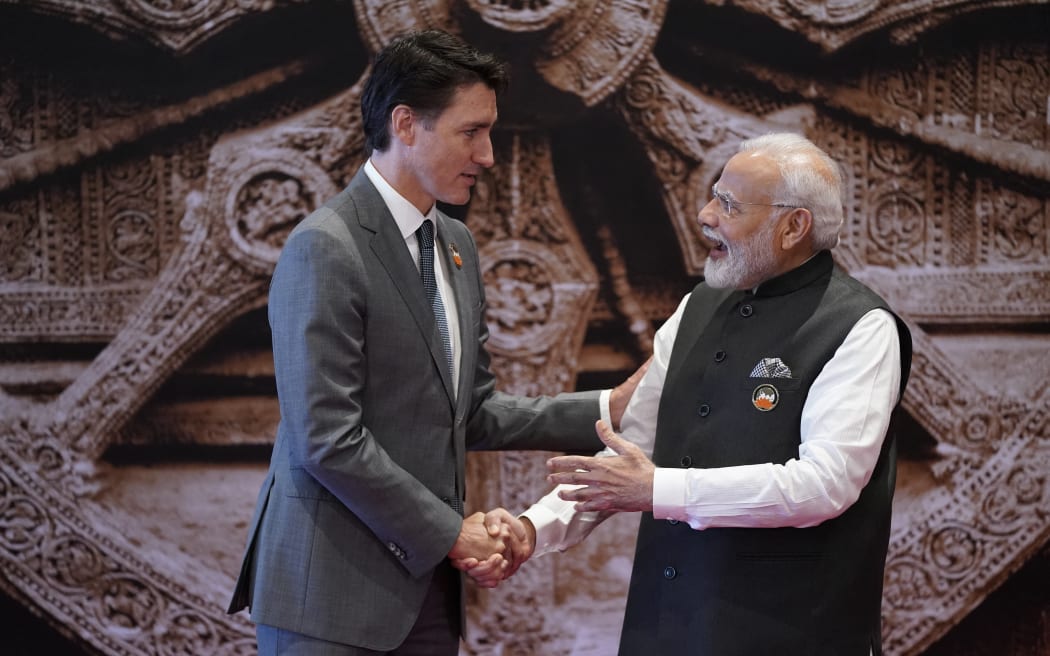
Indian Prime Minister Narendra Modi shakes hands with Canadian Prime Minister Justin Trudeau ahead of the G20 Summit in New Delhi in September. Photo: AFP / Pool
New Zealand has joined Australia, the United Kingdom and the United States in raising concern over threats India recently levelled at Canadian diplomats amid a bitter dispute over the recent murder of a Sikh separatist.
In September, Prime Minister Justin Trudeau claimed that Canadian security forces were actively pursuing credible allegations linking Indian government agents to the June murder of Khalistan Tiger Force leader Hardeep Singh Nijjar.
India's Ministry of External Affairs initially called the claims "absurd and motivated".
New Delhi then threatened to unilaterally revoke Canadian diplomats' privileges and immunity unless Ottawa reduced the number of envoys it had in India.
On 19 October, Canada withdrew 41 diplomats from India, as well as 42 of their dependents.
On Wednesday, the Ministry of Foreign Affairs and Trade repeated statements made by its Five Eyes partners criticising New Delhi's actions.
"We are concerned India's demand that Canada reduce its diplomatic presence there has led to the departure of a large number of Canadian diplomats from India," said a statement from MFAT on X (formerly Twitter). "Now seems the time for more diplomacy, not less. We expect all states to uphold their obligations under the 1961 Vienna Convention on Diplomatic Relations, including in relation to the privileges and immunities of accredited staff."
On 20 October, Britain's Foreign, Commonwealth and Development Office said it expected all states to uphold their obligations under the 1961 convention.
"Resolving differences requires communication and diplomats in respective capitals," the statement said. "We do not agree with the decisions taken by the Indian government that have resulted in a number of Canadian diplomats departing India.
"We continue to encourage India to engage with Canada on its independent investigation into the death of Hardeep Singh Nijjar."
The statement echoed an earlier press statement by US State Department spokesperson Matthew Miller.
"We are concerned by the departure of Canadian diplomats from India, in response to the Indian government's demand of Canada to significantly reduce its diplomatic presence in India. Resolving differences requires diplomats on the ground," Miller said. "We have urged the Indian government not to insist upon a reduction in Canada's diplomatic presence and to cooperate in the ongoing Canadian investigation."
On 22 October, Australia's Department of Foreign Affairs and Trade also called on India to uphold the 1961 convention.
"Australia is concerned by the departure from India of Canadian diplomats in response to India's decision," Australia's foreign ministry said. "We have conveyed our concerns at senior levels to India. Working through issues between countries requires dialogue and diplomats on the ground play a valuable role."
India rejected the concerns raised by the Five Eyes partners, denying that its actions violated the Vienna Convention.
"The state of our bilateral relations, the much higher number of Canadian diplomats in India, and their continued interference in our internal affairs warrant a parity in mutual diplomatic presence in Delhi and Ottawa," India's Ministry of External Affairs said in a statement.
"Our actions in implementing this parity are fully consistent with Article 11.1 of the Vienna Convention on Diplomatic Relations, which states the following: In the absence of specific agreement as to the size of the mission, the receiving state may require that the size of a mission be kept within limits considered by it to be reasonable and normal, having regard to circumstances and conditions in the receiving state and to the needs of the particular mission.
"We reject any attempt to portray the implementation of parity as a violation of international norms," the ministry said.

